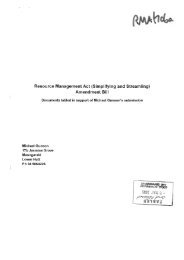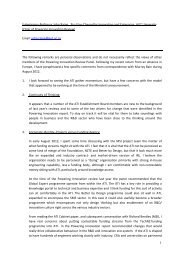Parliamentary Debates (Hansard) - New Zealand Parliament
Parliamentary Debates (Hansard) - New Zealand Parliament
Parliamentary Debates (Hansard) - New Zealand Parliament
Create successful ePaper yourself
Turn your PDF publications into a flip-book with our unique Google optimized e-Paper software.
16 May 2009 Local Government (Auckland Council) Bill 3755<br />
Clerk—to correct the motion. The Clerk had identified that Mr Hide had made a<br />
mistake. The Minister then corrected it. The next point is for me to put the resolution. If<br />
the motion had been moved and carried, it would have been, as Mr Mallard said, all<br />
over, Rover. It would then have been the decision of the House. At this stage, it is not<br />
the decision of the House.<br />
Hon TREVOR MALLARD (Labour—Hutt South): I raise a point of order, Mr<br />
Speaker. There are two points. The first relates to an indication at the beginning of a<br />
speech that there will be a motion to refer the bill to a select committee. You are<br />
absolutely correct in saying that members cannot move such a motion without their<br />
having signalled it at the beginning of the debate. Among the requirements is to signal<br />
which select committee the bill will go to, and any other restrictions. My submission to<br />
you is that those are the outside boundaries, and if a member later chooses to move<br />
something that is within those boundaries but does not take full advantage of them, then<br />
that is the right of the member.<br />
The other point I would like to refer you to is Speaker’s ruling 24/7—it goes back to<br />
1891, to Mr Speaker Steward—which indicates “A motion of which notice has been<br />
given cannot, when before the House, be altered by the mover without the unanimous<br />
consent of the House.” It is my submission to you that at the point that the Minister<br />
resumed his seat, that motion was before the House, and it cannot at that point be<br />
changed. I think it is pretty straightforward. The ruling is of very, very longstanding. A<br />
motion was moved that was within the boundaries of the notice that had been given, and<br />
the Minister then resumed his seat. At that point, the motion was before the House, and,<br />
notwithstanding your helpful advice—on the advice of the Clerk—to the Minister, it is<br />
my submission that at that point it was too late and you were obligated to put the motion<br />
in those terms.<br />
Hon RODNEY HIDE (Minister of Local Government): I have two points. The<br />
first is that it was not a motion on notice. The second point is to note the number of<br />
times throughout the day when members have given votes, then sought to correct them.<br />
That practice has been accepted by the House. That is exactly what happened here, Mr<br />
Assistant Speaker. I admitted my mistake, and I thank you for pointing it out. The<br />
motion had not been put. It can now be put.<br />
Hon JOHN CARTER (Associate Minister of Local Government): I want to add<br />
to the comments made by both the previous speakers, with regard to Speaker’s ruling<br />
24/7. Mr Assistant Speaker, I am sure you have noticed that the ruling refers to a motion<br />
of which notice has been given: “A motion of which notice has been given cannot,<br />
when before the House, be altered by the mover without the unanimous consent of the<br />
House.” However, in this case the motion was not a motion with notice; it was a verbal<br />
motion. So that Speaker’s ruling does not apply in this particular case. We all know that<br />
notices of motion are on the Order Paper. In this particular case, the motion was not on<br />
the Order Paper.<br />
Indeed, if we think about it, Mr Assistant Speaker—and I believe that you are<br />
absolutely right and I support your view—we will recall that the Minister had indicated<br />
that he would be moving a motion in the way that he finally did. There is a requirement<br />
to give such notice in the first reading speech, and for the previous member to suggest<br />
that the Minister could do something within the bounds of that notice is actually not<br />
true. The Minister is duty-bound, then, to put to the House the motion that he verbally<br />
gave notice he would put, and we need to now follow that. Mr Assistant Speaker, your<br />
ruling and indication to the House are, in my view, absolutely correct.<br />
Hon DARREN HUGHES (Senior Whip—Labour): I shall pick up on the point<br />
made by the Mr John Carter. Speaker’s ruling 24/7 refers to notice. In a sense, the<br />
Minister foreshadowed in his first reading speech that he would be moving a motion.






![Full evidence text [PDF 8908k] - New Zealand Parliament](https://img.yumpu.com/14025494/1/184x260/full-evidence-text-pdf-8908k-new-zealand-parliament.jpg?quality=85)
![−3 JUN 2009 IRELEASED] - New Zealand Parliament](https://img.yumpu.com/12829724/1/185x260/3-jun-2009-ireleased-new-zealand-parliament.jpg?quality=85)
![Full paper text [PDF 3515k] - New Zealand Parliament](https://img.yumpu.com/11267192/1/184x260/full-paper-text-pdf-3515k-new-zealand-parliament.jpg?quality=85)


![Full evidence text [PDF 9k] - Parliament](https://img.yumpu.com/7938085/1/184x260/full-evidence-text-pdf-9k-parliament.jpg?quality=85)





